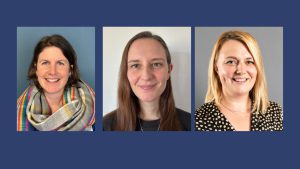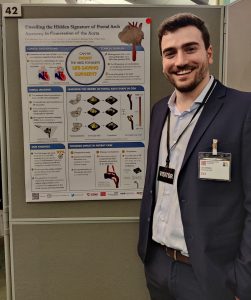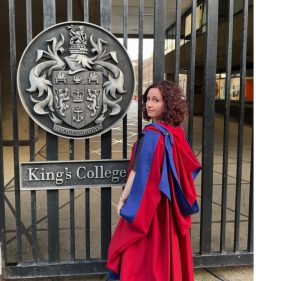Following on from last blog, we continue to share entries from the HSDTC Science Communication Competition, where doctoral researchers in the four Health Faculties showcase their work in engaging newspaper-style articles.
Li Ling, Faculty of Natural, Mathematical & Engineering Sciences, Informatics
New tool spots hidden patterns in massive datasets — in minutes
A powerful new data-mining tool developed at King’s College London can analyse hundreds of millions of data points and detect patterns in less than 20 minutes—something that could take existing systems over a day.
From identifying patient groups based on heart readings to tracking whale calls underwater, this breakthrough could transform how we make sense of massive datasets in medicine, transport, finance, and more.
The key lies in its clever design. While many current algorithms slowly scan through data line by line, this tool builds a special structure—like an index—so it can jump directly to where patterns hide. This structure can be reused to uncover different types of trends quickly and with minimal memory, even across massive datasets.
“When analysing underwater recordings, our tool found hidden patterns in dolphin and whale sounds in just 18 minutes,” said Ms Ling Li, a PhD student who worked on the project. “Other tools failed to finish even after 24 hours.”
It’s already making waves in medicine. In a study using heart monitor data, the tool discovered two distinct groups of people: those who experienced exercise-related pain and those who didn’t. The patterns revealed that more active individuals reported more pain—a finding that could help tailor exercise plans.
The team is now extending the tool to other medical data, such as sleep studies. They also plan to make the tool context-aware, so it not only finds patterns but helps explain what they mean—vital for applications in bioinformatics and beyond.
This tool shows how smart data handling can unlock insights hidden in plain sight—and fast.
Martina Galea Mifsud, Faculty of Dentistry, Oral & Craniofacial Sciences, Centre for Oral, Clinical and Translational Sciences
Revolutionising bone grafts: PEEK scaffolds offer new hope for patients
A groundbreaking development in bone reconstruction could soon transform the way we treat patients with cancer. A researcher at King’s College London is exploring the potential of the advanced biomaterial polyetheretherketone, in short PEEK, scaffolds for use in bone grafting.
PEEK, which is a synthetic polymer with incredible physical and chemical properties, has long been used in medical implants thanks to its strength, durability and biocompatibility. Now, scientists are pushing its boundaries by creating scaffolds which mimic the natural structure of bone – solid from the outside and porous from the inside. These scaffolds act as permanent frameworks to guide new bone growth and integrate within the body, in a process which scientists call ‘osseointegration’. Once they are part of the patient’s body, they are there for life!
A main driving force behind this research is the need for improved solutions for patients who need to undergo any form of bone reconstruction, but especially those needing maxillofacial reconstruction. This is because currently, a patient would need to have secondary surgery on their leg (namely, the fibula bone) to harvest bone to be used for reconstruction of facial defects – making this process invasive, painful, and frankly – unnecessary. The PEEK scaffolds being created in this study not only offer the traditional physical and chemical benefits, but also have the added feature of actively integrating within the bone biologically, something which there is currently very little research about!
“We want to offer alternative solutions to our patients, removing the need for additional surgery”; Martina Galea Mifsud; primary researcher and Maxillofacial Prosthetist says. “PEEK has the potential for exactly this. In the future, the scaffold can also be [3D] printed with dimensions tailored to each individual patient, marking a shift in outdated practices which have been used for decades”.
The research aims to not only fabricate the scaffolds, but also modify with a natural chemical called ‘peptide’, which would allow the human body to integrate this scaffold. This pioneering work could soon pave the way for a new era in bone regeneration, where science and technology converge to rebuild lives, one patient at a time.
Mrinalini Dey, Faculty of Life Sciences & Medicine, Inflammation Biology
From blah blah to aha! Making health make sense
When did you last speak to a health professional?
Perhaps you were receiving a new medication. Perhaps you were getting vaccinated. Perhaps you were having a test.
Did you understand all the information you received?
If not, you are not alone.
Seven million adults in the UK read at or below the level of a nine-year-old. This has profound consequences, especially when it comes to health materials, which can be complex and full of jargon. Almost half of all adults struggle to understand information which could help them to manage their own health.
Health literacy is the “ability to gain access to, understand and use information to maintain good health.” Limited health literacy has been linked to poor health outcomes, including increased hospital admissions, low use of preventative services (such as vaccination and screening) and reduced life expectancy.
More people are living with chronic conditions, such as diabetes and heart disease. Rheumatic diseases are complex chronic conditions, due to overactivity of the immune system. These affect the joints, as well as other organs such as the skin and lungs. Examples include rheumatoid arthritis and lupus. Increasing evidence demonstrates socioeconomic factors, such as deprivation, greatly influence the health experience of people living with rheumatic diseases. However, until now, few to no studies have investigated the importance of health literacy in people living with these, often debilitating, conditions.
Through assessing health literacy in a thousand people with rheumatic diseases across the UK, we have shown that low health literacy is associated with having more joint symptoms such as pain, decreased likelihood of employment and attendance at work, and a greater number of co-existing health conditions, such as diabetes and high blood pressure.
It is time to reverse the health literacy epidemic. Only through understanding the impact of health literacy on people’s lives and health can we develop interventions which enable treatment plans to be tailored to an individual’s health literacy needs.
In doing so, we will empower people to take control of their health, make health-related decisions, and have the confidence to discuss these with their doctor and wider healthcare teams.
Syed Alhafiz Bin Syed Hashim, Faculty of Life Sciences & Medicine, Institute of Pharmaceutical Science
Breaking through the dark magic: Reprogramming cancer’s defences
Cancer remains one of the world’s greatest health challenges, and despite decades of research, many patients still face tough odds. A key reason is that tumours do not grow in isolation. They are surrounded by a complex mix of cells, blood vessels, and immune components that protect them. Imagine the tumour as Voldemort, shielded by layers of dark magic and enchanted defences. These biological barriers are like protective spells that help the cancer resist treatment. Just as Voldemort uses his magic to survive and grow stronger, the tumour’s environment protects the cancer, making it harder for chemotherapy and the immune system to reach and destroy it.
At King’s College London, a team led by Professor Al Jamal is working to change this. Syed Alhafiz, a PhD researcher, is exploring a promising new therapy for an aggressive form of breast cancer that resists traditional treatments. This cancer does not respond well to some therapies and is difficult to target with chemotherapy. His research focuses on tiny lipid carriers that deliver chemotherapy directly to cancer cells while sparing healthy tissue. These carriers are like Harry Potter’s magical tools, smart, selective, and precise, able to slip past the tumour’s barriers and strike the true target.
The team is also investigating how these lipid carriers might alter the tumour’s environment. By weakening the tumour’s defences, they make it more vulnerable to treatment and help the immune system fight back. This mirrors how Harry and his allies worked to dismantle Voldemort’s protections and expose his weaknesses. This work is not limited to breast cancer alone. Similar methods are being applied to target brain cancer, as well as diseases that affect the nervous system, such as ALS, which weakens muscles and nerves.
Like the final battle between good and evil, this research aims to tip the balance in favour of the body. By reprogramming the tumour’s environment, this approach may enhance treatment effectiveness and reduce harm to healthy cells, offering new hope for more precise and powerful cancer care.
Yujia Yang, Faculty of Life Sciences & Medicine, School of Cardiovascular and Metabolic Medicine & Sciences
From stress to peace: Early detection of a silent killer (Ishaemic Heart Disease)
Imagine being told to sprint on a treadmill or ride a bicycle while your heart is monitored for signs of disease. For many patients—especially the elderly or those with limited mobility—this so-called “stress echocardiography” feels more like a stress ordeal.
But researchers at King’s College London may have found a better way—a more peaceful solution.
They’ve developed a promising new measure of heart function called First-Phase Ejection Fraction (EF1), which could detect heart disease earlier—and far less stressfully—than traditional methods.
Ischaemic heart disease (IHD), a silent killer caused by narrowed or blocked arteries, can often lead to chest pain, heart attacks, or heart failure. The earlier it’s caught, the better the chances of prevention.
Since most people with IHD don’t show symptoms or signs of abnormalities at rest, their heart has to be put under “stress”—through exercise or medication—to reveal the problem. But not everyone can manage this “stress.” Patients often describe it as a “torturing chamber”—exhausting, and sometimes the results are inconclusive if they cannot achieve the required amount of exercise. Therefore, a more peaceful and smarter solution is needed.
EF1 works differently. It measures the heart’s initial contraction—a key early signal of dysfunction—using a standard ultrasound scan (echocardiography). No treadmill, no drugs, no stress.
First introduced in 2017, EF1 has already shown promise in detecting many common conditions, such as high blood pressure and complications from COVID-19. With the help of artificial intelligence, it could soon become even more accurate and accessible.
Better for Patients—and the NHS
Stress echocardiography costs the NHS about £340 per patient, while EF1, which can be measured during a routine ultrasound, costs just £120—and is easier to perform across a wider range of patients.
That’s why EF1 is being trialed in the EVAREST study, involving over 8,000 NHS patients who underwent stress echocardiography nationwide. Upon completion of this study, we aim to provide a faster, cheaper, and—more importantly—a peaceful way to diagnose IHD before it becomes life-threatening.
Early detection saves lives. With tools like EF1, the future of cardiac care could be more accessible—and far less stressful—for patients everywhere.











